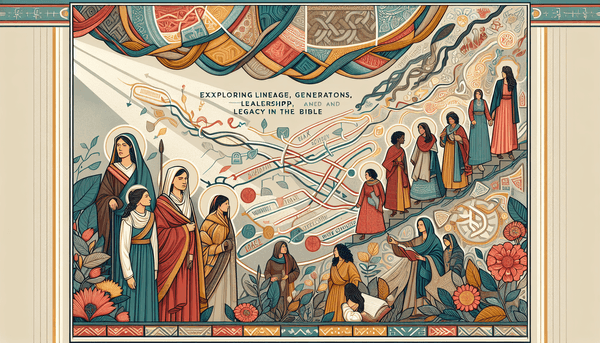The Lineage of Jesse and Its Connection to Notable Biblical Figures
At the heart of biblical genealogy lies Jesse, whose lineage is a testament to God's providence and the fulfillment of prophecy. Jesse, the father of King David, connects us to the storied lives of Boaz and Ruth, as described in Ruth 4:22. Boaz, the son of Salmon and Rahab, emerges from a lineage marked by faith and redemption, showcasing the inclusion of a Gentile, Rahab, into the fold of Israel's heritage. Rahab's story, depicted in Joshua 2, demonstrates her unwavering faith in the God of Israel. Boaz later mirrors this kindness and faith by marrying Ruth, a Moabite widow whose loyalty to her mother-in-law Naomi and the God of Israel is immortalized in Ruth 1:16-17. This union not only signifies the providence of God but also foreshadows the genealogy of Jesus, as outlined in Matthew 1:5-6, where Ruth is mentioned as a key figure in the lineage of Christ.
Discovering Our Identity in God
Our quest for identity finds its beginning in the biblical affirmation that we are created in the image of God, a profound truth articulated in Genesis 1:27. This identity is further transformed and elevated in Christ, as believers are clothed with a new purpose and destiny, a metamorphosis encapsulated in 2 Corinthians 5:17. The scriptures reveal that we are not only fashioned by God but also for God, created for good works as expressed in Ephesians 2:10. To better understand how this divine purpose intertwines with daily living and our actions, such as responding to social issues and personal communion with God, explore our related discussion. Our divine purpose is further underscored by the notion that we are a chosen generation, called to a royal priesthood as declared in 1 Peter 2:9, and known intimately by God even before our birth, a concept beautifully captured in Jeremiah 1:5.
The Theme of God's Sovereign Choice
The narrative of scripture is replete with instances of God's sovereign choice, selecting individuals for specific purposes and missions. David's anointment as king, despite his humble beginnings, is a prime example of this divine selection, as detailed in 1 Samuel 16:12-13. This theme extends to the New Testament, where Jesus affirms that His disciples were chosen to bear fruit, as stated in John 15:16. Believers are comforted by the knowledge that they are predestined for adoption into God's family, a profound truth revealed in Ephesians 1:4-5, and are reminded that they are part of a chosen people, a royal priesthood, as proclaimed in 1 Peter 2:9. These passages underscore the reassurance that being chosen by God situates us within a divine plan, far exceeding human comprehension.
Conclusion
In the rich tapestry of the Bible, we find enduring narratives that speak to our hearts and guide our lives. Through the lineage of Jesse, the affirmation of women in leadership, the discovery of our identity in God, and the comforting theme of being chosen, we are invited to engage with a story much larger than ourselves. These biblical conversations not only deepen our understanding of historical events but also encourage us to navigate the complexities of relationships, thoughts, and pride. As contemporary believers, we can draw strength and inspiration from these teachings, embracing our calling with faith and obedience.






